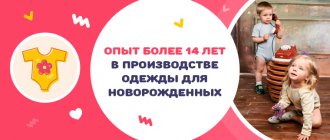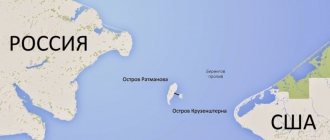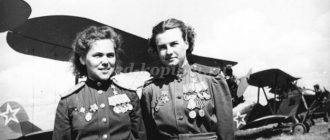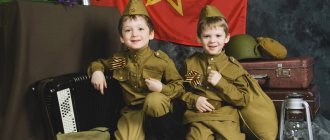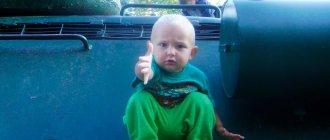How to start a difficult conversation with a child about war?
The ceremonial cry “Victory!”
sounded more than 70 years ago. Much water has passed under the bridge since then, and there are practically no veterans left alive. If parents, educators and teachers do not tell children about the Second World War, the exploits of our great-grandfathers will be forgotten and disappear into thin air, like zilch, as if they never happened. This cannot be allowed to happen. To have a conversation on such an “adult” topic, you need to choose the right moment. It is best to start a conversation on the eve of May 9th. Moreover, having seen how the streets in the city are decorated and the parade is being rehearsed, a preschooler himself can begin to ask questions. Don’t disown this little why this time: take a break from business, sit next to him and tell him about where his great-grandmothers and great-grandfathers were born, how they grew up and how they went to the front to defend their homeland.
It will also be useful to read poems about the war with your child, which tell about the courage, valor and heroism of their ancestors. Here is a large selection aimed at children of different ages - from preschoolers to high school students, in which you can also find touching lines to congratulate veterans:
- poems for May 9 (and the second option - here);
- poems about war for schoolchildren;
- poems about the unknown soldier;
- poems about the siege of Leningrad.
Songs will help you feel even more strongly the scale of your accomplishments and feel pride in your great-grandfathers. Children can not only listen to the following compositions, but also perform them at the festive concert:
- songs for May 9;
- songs of the Great Victory;
- war songs.
Poems about war for children 4-5 years old
***
Let there be peace
Let the sky be blue, Let the smoke not billow in the sky, Let the formidable guns be silent And the machine guns not shoot, So that people and cities can live... Peace is always needed on earth!
Author: Naydenova N.
***
Grenades
Down with the pistols! Down with machine guns! Down with all guns and mines! Long live only pomegranates, Which contain... vitamins!!!
Author: Shapiro T.
***
I watched a film about the war
I watched a film about the war, and I was very scared. Shells exploded, the battle raged, and people died.
And grandfather sat next to him, And there were medals on his chest. Because together with his country he broke the evil force... I stroke the medals with my hand and kiss my grandfather.
Author: Turov V.
***
No one is forgotten
“No one is forgotten and nothing is forgotten” - Burning inscription on a block of granite. The wind plays with faded leaves and covers the wreaths with cold snow. But, like fire, at the foot there is a carnation. No one is forgotten and nothing is forgotten.
Author: Shamarin A.
***
No, the word peace will hardly remain
No, the word “peace” will hardly remain, When people will not know war. After all, what was previously called the world, Everyone will simply call life.
And only children, experts on the past, Having fun playing war, Having run around, will remember this word, With which they died in the old days.
Author: Berestov V.
***
We need peace
Everyone needs peace and friendship, Peace is more important than anything in the world, On a land where there is no war, Children sleep peacefully at night.
Where the guns don't thunder, the sun shines brightly in the sky. We need peace for all the guys. We need peace on the entire planet!
Author: Chechel V.
***
We believe in Victory
Concentrating regiments against us, the enemy attacked a peaceful country. On a white night, on the whitest night, I started this black war!
Whether he wants it or not, he will get what he wants from the war: Soon even the days, not just the nights, will become black for him!
Author: Shefner V.
***
Grandfather's portrait
Grandma put on the medal and now she’s so beautiful! She celebrates Victory Day, remembering the great war.
Grandma's face is sad. There is a soldier's triangle on the table. Grandfather’s letter from the front is very painful for her to read even now.
We look at grandfather’s portrait and shake hands with my brother: “Well, what kind of grandfather is this?” He's still just a boy!
Author: Turov V.
***
Let pigeons walk on the roofs, Let cranes melt in the sky... Let there be peace! We need him so much! People all over the world need peace! Let there be rivers, cities and villages, Let the forest grow, bridges be built... Let the children of the whole planet go to school, Let flowers bloom in all courtyards!
Author: Gavrilenko N.
***
Victory Day
Victory Day May 9 is a holiday of peace in the country and spring. On this day we remember the soldiers who did not return to their families from the war.
On this holiday we honor the grandfathers who defended their native country, who gave the peoples Victory and who returned peace and spring to us!
Author: Tomilina N.
***
I play toy soldiers
I play toy soldiers. I have a gun. There is a saber, there are also tanks. I'm big and I'm 5 years old!
I play toy soldiers. This is a child's game. But I know this for sure - Our World was Created for Good!
Author: Shapiro T.
***
Victory Day
The May holiday - Victory Day is celebrated by the whole country. Our grandfathers put on the Military Orders. In the morning the road calls them to the solemn parade, And grandmothers look after them thoughtfully from the threshold.
Author: Belozerov T.
***
The word is very necessary
There is a word in the world - necessary and important, Like the sun, it warms this word for everyone.
Write without a blot He really wants Light This word is important, Warm like summer.
Peace for all peoples, Peace on the entire planet! We really need him - Me, you and Sveta.
Author: Rodina M.
***
Peaceful rhyme
One two three four five! All the miracles cannot be counted. Red, white, yellow, blue! Copper, iron, aluminum!
Sun, air and water! Mountains, rivers, cities! Work, fun, sweet dreams! And let the war come out!
Author: Karem M.
***
During the days of war
The eyes of a seven-year-old girl are like two faded lights. A large, heavy melancholy is more noticeable on a child’s face.
She is silent, no matter what you ask, If you joke with her, she is silent in response. As if she were not seven, not eight, but many, many bitter years.
Author: Barto A.
How to explain to children why the war started?
In childhood, everything seems so simple: cross your little fingers, say the magic words “make up, make up and don’t fight anymore” - and again you’re friends forever. But in the adult world everything is much more complicated and confusing. This is how you need to explain to a child, without inventing anything: the rulers of different countries envy their neighbors who live better and start wars to seize other people’s wealth and natural resources. As for the Second World War, we can say that the Fuhrer of Germany Adolf Hitler believed that his nation was the best, and in order to prove this to the whole world, he decided to establish a fascist regime and turn other nations into his slaves.
What should you tell a schoolchild about the war?
Know about the events of 1941-1945. every educated person should, therefore the study of the Great Patriotic War is included in the school curriculum for grades 9-11. To prevent the guys from getting tired, we suggest absorbing information in doses. Short but succinct articles will help with this:
- Causes, results and key events of the Second World War.
- The role of the partisan movement.
- The essence of fascism and Nazism.
- How the Soviet Union prepared for war.
- Losses in World War II.
- USSR in the post-war years.
And so as not to be boring, the educational process can and should be diluted with proverbs. They reflect centuries-old folk wisdom, the feelings of people, their pain of loss and the joy of victory. So these sayings will help to understand how a person survived those terrible events, and at the same time enrich speech:
- Proverbs and sayings about war.
- Proverbs and sayings about peace.
- Proverbs and sayings about patriotism.
- Proverbs and sayings about defenders of the Fatherland.
- “Peace builds, but war destroys” is the meaning of the proverb.
After studying the topic, it is time to show how well you have mastered it. Therefore, all high school students will benefit from a selection of essays. These are just examples, but they can be used as a basis when writing your text:
- essays on the theme of Victory Day;
- essays about war;
- essays about the feat;
- essay on heroism;
- essay about child heroes.
Consultation for kindergarten parents. How to tell children about the Second World War
How to tell children 5-7 years old about the Great Patriotic War"
Consultation for parents “Let’s tell children about the Great Patriotic War”
Author: Maria Nikolaevna Chukmareva, teacher, MBDOU Pychassky kindergarten No. 2, Pychas village, Udmurtia Description of work : this material can be used in their work by teachers of senior, preparatory groups, as well as parents , to familiarize children of senior preschool age with the history of the Great Patriotic War. Goal: enriching children's ideas about the Great Patriotic War, about heroes, home front workers, war veterans, through the joint activities of parents and children in the family. Objectives : - introduce the history of the Great Patriotic War, full of examples of the greatest heroism and courage of people in the struggle for the freedom of the Motherland; - lead to the perception of works of art about the war; - to form moral and patriotic qualities: courage, courage, the desire to defend one’s homeland, through reading fiction about the war; — to cultivate conscious love for the Motherland, pride in its past. The history of our country has never been serene. It has two special dates: June 22 - the beginning of the Great Patriotic War and May 9 - Victory Day. Seventy years have passed since the Victory in the Great Patriotic War, but the greatness of the feat of our people still does not fade. The victory over fascism is a great lesson for all generations. Therefore, we, adults, must make sure that our children, already in preschool age, know and remember these joyful and tragic pages of our history and do not repeat the mistakes of the past. No wonder O. Bismarck said: “Even a victorious war is an evil that must be prevented by the wisdom of the people.”
May 9 is a simple and at the same time difficult holiday for children to understand. On the one hand, a simple and understandable theme of the struggle between good and evil, but on the other, it is very difficult to explain why there was a war, why people destroyed each other. The theme of war is very deep and serious, especially for children 5-6 years old. This age has its own specifics: the child does not have a tragic perception of the world due to limited childhood experience and the presence of insufficiently formed temporary connections. Moreover, in the age of information technology, the line between reality and play is gradually blurring among modern children. It is very difficult for children to understand such complex topics in all the variety of specific information. Thinking in preschool age has a pronounced concrete, imaginative character and in many ways still retains a close connection with practical activity. It is very difficult for children to understand something that does not pass through their practical activities.
Therefore, special attention should be paid to children’s emotional perception of the theme of war - the struggle between good and evil. After all, it is not enough for them to know, they must feel. Perceived by the heart, all information can be remembered for a long time and give unexpected results. In order for children to develop an interest in this topic, targeted work is carried out in children's educational institutions, namely, thematic classes, reading fiction, productive, playful, theatrical activities, and joint trips to the museum. But the time allocated in kindergarten for joint activities with children on this topic is clearly not enough. Therefore, this work involves the active participation of parents not only in events held within the kindergarten, but also familiarizing children with the topic of the Great Patriotic War in the family. We offer approximate forms of work for studying this topic for parents with their children at home: - reading literature, conversations and watching TV shows on military topics; - examination of illustrations, family photographs (grandparents); - verbal - didactic games; - memorization of poems, proverbs, sayings, songs on a military theme;
— participation in exhibitions of joint family creativity; — visiting military museums, getting acquainted with monuments, excursions to memorable historical places (if possible). I would like to pay special attention to parents in familiarizing preschool children with works about the Great Patriotic War, which foster historical memory, respect, and pride for their Motherland.
What books about war for children can you recommend children to read?
Of course, the most interesting for them will be those works whose heroes are their peers. What did their peers go through? How did you behave in difficult situations? What contribution did you make to the Victory? Almost everything written about war for children was created in the second half of the twentieth century. There is one theme in children's literature for preschoolers - the memory of the Great Patriotic War. Few authors address the events of the war years directly. Not everyone is given the right to this; it must be earned. Invented stories about the adventures of brave soldiers, easy feats and quick victories, which captivate children so much, are not suitable. What is needed is truth – bright, convincing, living. We need a meaning that is accessible to the little reader and at the same time worthy of the event in question. Before introducing preschoolers to works about the war, it is necessary to prepare them to perceive this complex topic: - give a little information from history;
-tell little listeners about how soldiers courageously defended their homeland, about the value and uniqueness of every human life, about the feat of every person in the war and the entire people as a whole; - talk to them about the destructive nature of war, sweeping away all living things in its path, leaving behind human grief and scorched earth. And only when the child has formed at least the slightest idea of what “war” is, can you offer him stories about this most difficult time in the history of the country.
Many authors of children's literature knew from their own experience all the hardships of war and, having experienced it more than once in the process of creating works of art, they knew what they were telling readers about. You can't help but hear them. We bring to your attention a list of fiction that you can read with your family with preschool children, and then jointly discuss your impressions of what you read: - S.P. Alekseev “Stories from the history of the Great Patriotic War.”
The book is dedicated to the three main battles of the Great Patriotic War.
About how the grandiose battle near the walls of Moscow developed, about the heroism of the Soviet people who stood up to defend the capital; — E. Blaginin’s “The Overcoat” is about a childhood deprived of joy by someone’s evil will, fueled by a war that forced him to grow up early; - A. Barto “Zvenigorod”
- about wartime childhood in the rear;
- CM.
Georgievskaya "Galina's mother". This short story was written for children, for preschoolers, but it tells not about trifles, but about military valor
- Y.P. German “That’s how it was.”
The story is written on behalf of the little hero Mishka.
The author showed the war, the blockade in children's perception - there is not a single word in the work that would go beyond the boundaries of Mishka's understanding. — V.Yu.
Dragunsky Arbuzny Lane. (in the book “Deniska’s stories”).
Father tells Deniska about his hungry wartime childhood. — A.M. Zharikov “Brave guys”, “Maxim in the detachment”, “Yunbat Ivanov”. — V.A. Oseeva “Andreyka.”
The story is about seven-year-old Andrey, who helps his mother during the difficult war years and tries to replace his older brother, who has gone to the front.
— K.G.
Paustovsky “Steel ring. A fairy tale about a girl and a magic ring that a fighter gave her.
-AND.
Tokmakov’s “The Pines Are Noisy” - about how war does not let go of a person for many years.
— Shishov A. “Forest Girl”
.
From the book, the children learn about the fate of the little girl Tanya, the granddaughter of an old partisan, during the Great Patriotic War. — Yu. Yakovlev “How Seryozha went to war.”
A poignant tale about a boy Seryozha who wanted to see the war with his own eyes.
And he was led along the military road by none other than his own grandfather... who died in an unequal battle. It was not an easy campaign - after all, war is not a walk in the park, but hard work, dangers, sleepless nights and endless fatigue. -L. Kassil “Your defenders”; — S. Mikhalkov “Victory Day”.
Of course, these are not all works that can be read with preschool children. But one thing is clear - talking about the war, reading about it is not only necessary, but also necessary. What is important, first of all, is the meaning, the values that a growing person will assimilate from childhood with the help of us - adults, and which he will think about, if not now, then later.
Let the world be decorated with kindness And faces bloom with smiles, And let the word “terrible” war never happen again!
Let the sun shine over the earth, Let love walk across the planet. And in every big family there will be children with their beloved mother! (M.V. Sidorova)
Used literature: 1. Gritsenko Z. “The theme of war in literature. For preschool children" - magazine "Preschool Education" No. 1, 2015 2. Romanova O.Yu., Golovina E.E., Blinova TM. Project activity “Combat glory of our people” - magazine “Teacher of a preschool educational institution” No. 6, 2014 3. Maksakova E. F. “Such a simple and complex holiday ...” - magazine “Teacher of a preschool educational institution” No. 5, 2014
We recommend watching:
Victory Day. Scenario for older preschoolers and 1st - 2nd grades Dogs - heroes of the Great Patriotic War Conversation about the Second World War for elementary school students Consultation for parents. Children about the Great Patriotic War
Similar articles:
9th May. Scenario for kindergarten. Victory Day in kindergarten
Victory Day. Scenario May 9 for kindergarten
Victory Day in the senior and preparatory groups. Scenario
Scenario for the Victory Day holiday in the younger group
Scenario of the matinee for May 9. Middle group
Interesting books and audio stories about the war
Older children who study at school are already assigned to read thematic literature. Very often they are scared away by the “many letters”, but the eve of May 9 is the time to catch up. You will be surprised, but works of fiction based on the events of the Second World War are really interesting. They have epic battles, dynamic plots, and keep you in suspense even worse than action films. Alternatively, read the short retellings - after that it will become so interesting that you will want to take up the original:
- Vasily Terkin - a poem about the life of a soldier at the front.
- And the dawns here are quiet... - a story about five selfless girls who are anti-aircraft gunners.
- The story is about a real person - about the feat of a Soviet pilot shot down by a fascist plane. The plot is based on real events.
- Three girls - about the life of one communal apartment during the siege of Leningrad.
An alternative option is audiobooks for children about the Great Patriotic War. The big advantage of such works is that you can listen to them anywhere while doing other things. Here are a few books with interesting voice-overs:
- Son of the Regiment is a story showing the war through the eyes of a child.
- The Doll is a heartfelt story about cruelty and indifference in the post-war world.
- The destiny of man is about a man of amazing fortitude. He survived the horrors of the war, went through a concentration camp, but retained a good heart and, after returning from the front, “adopted” a street boy.
- A golden cloud spent the night - about the difficult life of orphans during the war years.
Children about the Great Patriotic War
How to tell children about the Great Patriotic War? With this story you can tell your children about the war in an accessible way.
It presents a chronology of the main events of the Great Patriotic War.
Victory will be ours! Author: S. P. Alekseev
It was the shortest night of the year. People were sleeping peacefully. And suddenly:
- War! War!
On June 22, 1941, German fascists attacked our homeland. They attacked like thieves, like robbers. They wanted to seize our lands, our cities and villages, and either kill our people or make them their servants and slaves. The Great Patriotic War began. It lasted four years.
The path to victory was not easy. The enemies attacked us unexpectedly. They had more tanks and planes. Our armies were retreating. The battles took place on the ground, in the sky, and at sea. Great battles thundered: Moscow, Stalingrad, the Battle of Kursk. Heroic Sevastopol did not surrender to the enemy for 250 days. For 900 days, courageous Leningrad held out under a terrible siege. The Caucasus fought bravely. In Ukraine, Belarus, and other places, formidable partisans crushed the invaders. Millions of people, including children, worked at factory machines and in the fields of the country. The Soviet people (the Soviet Union was the name of our country in those years) did everything to stop the Nazis. Even in the most difficult days, they firmly believed: “The enemy will be defeated! Victory will be ours!"
And then the day came when the advance of the invaders was stopped. The Soviet armies drove the Nazis out of their native land.
And again battles, battles, battles, battles. The blows of the Soviet troops are becoming more and more powerful, more and more indestructible. And the most long-awaited, greatest day came. Our soldiers reached the borders of Germany and stormed the capital of the Nazis - the city of Berlin. It was 1945. Spring was blooming. It was the month of May.
The Nazis admitted their complete defeat on May 9. Since then, this day has become our great holiday - Victory Day.
Our people showed miracles of heroism and courage while defending their native land from the Nazis.
The Brest Fortress stood on the very border. The Nazis attacked it on the very first day of the war. They thought: one day - and the fortress is in their hands. Our soldiers held out for a whole month. And when there was no strength left and the Nazis broke into the fortress, its last defender wrote on the wall with a bayonet: “I’m dying, but I’m not giving up.”
There was the Great Moscow Battle. Fascist tanks rushed forward. On one of the sections of the front, the enemy’s road was blocked by 28 heroic soldiers from General Panfilov’s division. Dozens of tanks were knocked out by soldiers. And they kept walking and walking. The soldiers were exhausted in battle. And the tanks kept coming and going. And yet Panfilov’s men did not retreat in this terrible battle. The Nazis were not allowed to enter Moscow.
General Dmitry Karbyshev was wounded in battle and was captured. He was a professor, a very famous military builder. The Nazis wanted the general to come over to their side. They promised life and high positions. Dmitry Karbyshev did not betray his homeland. The Nazis executed the general. They took us outside into the bitter cold. They doused him with cold water from hoses.
Vasily Zaitsev is a famous hero of the Battle of Stalingrad. He killed three hundred fascists with his sniper rifle. Zaitsev was elusive to his enemies. The fascist commanders had to call the famous shooter from Berlin. That's who will destroy the Soviet sniper. It turned out the other way around. Zaitsev killed a Berlin celebrity. “Three hundred and one,” said Vasily Zaitsev.
During the battles near Stalingrad, field telephone communications were interrupted in one of the artillery regiments. An ordinary soldier, signalman Titaev, crawled under enemy fire to find out where the wire was broken. Found. He just tried to twist the ends of the wires when a fragment of an enemy shell hit the fighter. Before Titaev had time to connect the wires, then, dying, he clamped them tightly with his lips. The connection is working. "Fire! Fire!" - the commands sounded again in the artillery regiment.
The war brought us many deaths. The twelve Grigoryan soldiers were members of a large Armenian family. They served in the same department. They went to the front together. Together we defended our native Caucasus. Together with everyone else we went forward. One reached Berlin. Eleven Grigoryans died. After the war, the residents of the city where the Grigoryans lived planted twelve poplars in honor of the heroes. The poplars have now grown. They stand exactly in a row, like soldiers in formation - tall and beautiful. Eternal memory to the Grigoryans.
Teenagers and even children took part in the fight against enemies. Many of them were awarded military medals and orders for their bravery and courage. Valya Kotik, at the age of twelve, joined a partisan detachment as a scout. At the age of fourteen, for his exploits he became the youngest Hero of the Soviet Union.
An ordinary machine gunner fought in Sevastopol. Slayed enemies accurately. Left alone in the trench, he took on an unequal battle. He was wounded and shell-shocked. But he held the trench. Destroyed up to a hundred fascists. He was awarded the title Hero of the Soviet Union. The machine gunner's name was Ivan Bogatyr. You won't find a better surname.
Fighter pilot Alexander Pokryshkin shot down the first fascist plane at the very beginning of the war. Lucky Pokryshkin. The number of planes he shot down increases - 5, 10, 15. The names of the fronts on which the pilot fought change. The heroic score of victories grew and grew—20, 30, 40. The war was drawing to a close—50, 55, 59. Fifty-nine enemy planes were shot down by fighter pilot Alexander Pokryshkin.
He became a Hero of the Soviet Union.
Became twice Hero of the Soviet Union.
Became Hero of the Soviet Union three times.
Eternal glory to you, Alexander Pokryshkin, the first three times hero in the country.
And here is the story of another feat. Pilot Alexey Maresyev was shot down in an air battle. He survived, but was seriously wounded. His plane crashed on enemy territory in a deep forest. It was winter. He walked for 18 days, and then crawled to his own. He was picked up by the partisans. The pilot had frostbitten feet. They had to be amputated. How can you fly without legs?! Maresyev learned not only to walk and even dance on prosthetics, but most importantly, to fly a fighter. In the very first air battles, he shot down three fascist planes.
The last days of the war were passing. Heavy fighting took place on the streets of Berlin. On one of the Berlin streets, soldier Nikolai Masalov, risking his life, carried a crying German girl from the battlefield under enemy fire. The war is over. In the very center of Berlin, in a park on a high hill, there now stands a monument to a Soviet soldier. He stands with the rescued girl in his arms.
Heroes. Heroes... Feats. Feats... There were thousands, tens and hundreds of thousands of them.
More than seventy years have passed since that terrible time when the Nazis attacked our country. Remember with a kind word your grandfathers and great-grandfathers, all those who brought us victory. Bow to the heroes of the Great Patriotic War. To the heroes of the great war against the Nazis.
We recommend watching:
Women during the war. Stories for schoolchildren
War stories for schoolchildren
Stories about the Great Patriotic War for schoolchildren
Stories about war for schoolchildren. General Panfilov
Stories about war for schoolchildren. Zoya
Children's creativity for Victory Day
When telling children about May 9, you need to give them a short break to digest the information. At this time, holiday ideas for creativity will come in handy. The kids will show off their talents, soak up the holiday atmosphere, and even be able to prepare gifts for veterans.
Here are how many interesting things you can make with your own hands from scrap materials:
- crafts for May 9;
- paper sword;
- cool gun;
- paper shuriken;
- Military aircraft.
Also, any child can create a beautiful gift picture. How, you ask? It’s very simple: coloring pages can help. To turn into an artist, you only need colored pencils or markers. And for kids, this exciting pastime will also help develop fine motor skills.
Here are the outline pictures we have prepared for you:
- coloring pages for Victory Day;
- tank coloring pages;
- airplane coloring pages;
- Ship coloring pages.
Riddles and quizzes for the Ninth of May
No matter how difficult the prehistory of the holiday was, our great-grandfathers did not gnaw out Victory with their teeth so that their descendants would be sad. For the joy and smiles of children, this is a selection of exciting games that will also help test their knowledge:
- military riddles;
- riddles about the plane;
- military quiz.
We hope our selection will help children get into the holiday atmosphere, broaden their horizons and become true patriots. Develop your creative abilities, be proud of your history, get excellent grades in Russian and literature. Happy Victory Day!
